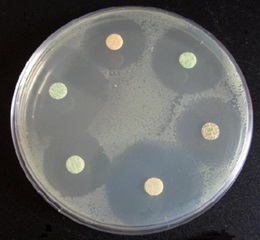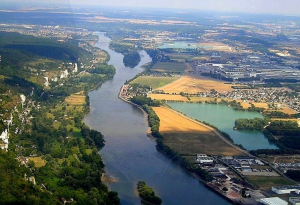During the past sixty years, the utilization of antimicrobial drugs has steadily increased. Antimicrobials are extensively used in human medicine and veterinary practices to treat or prevent bacterial infectious diseases. In addition, antimicrobials have also been used for years at subtherapeutic concentrations as growth promoters in animal husbandry. Indiscriminate use of antimicrobials has resulted in the increase in the number of antimicrobial resistant (AR) bacteria. Today, the dissemination of AR bacteria in the environment and the spread of resistance genes among environmental bacteria represent a major challenge for public health in the modern world.
Antimicrobials are extensively used in human medicine and veterinary practices to treat or prevent bacterial infectious diseases. In addition, antimicrobials have also been used for years at subtherapeutic concentrations as growth promoters in animal husbandry. Indiscriminate use of antimicrobials has resulted in the increase in the number of antimicrobial resistant (AR) bacteria. Today, the dissemination of AR bacteria in the environment and the spread of resistance genes among environmental bacteria represent a major challenge for public health in the modern world.
Faecal bacteria that have been exposed to high levels of antimicrobials in the human or animal digestive track can acquire AR; the release of AR faecal bacteria by wastewaters (treated or not) or by runoff could play a key role in AR determinants dissemination.

Indeed, in sewage-contaminated rivers horizontal resistance gene transfer can occur in both directions: pathogenic strains might receive resistance genes from autochthonous bacteria and resistance determinants present in faecal bacteria can be spread over to the autochthonous bacterial community.
In this field, ESA addressed the following main questions:
1) What is the occurrence of AR in aquatic environments contaminated with faecal bacteria from different origin (human, animals)?
2) Is there any relationship between the degree of sewage pollution of a river and the occurrence of AR heterotrophic bacteria?
3) What is the phylogenetic composition of the AR heterotrophic bacteria and what are their patterns of resistance?
To answer these questions, ESA has studied the occurrence of faecal AR bacteria in samples collected in rivers of the Seine hydrographical network (France) characterized by different levels of contamination and different origins of the faecal bacteria.
Works were also performed to study what was the phylogenetic composition of AR bacteria using plate counts and molecular methods.
Since October 2015, investigations are conducted by a post doc researcher (Proia, L.) on the AR of faecal and autochthonous bacteria in the Zenne River watershed (Belgium) using both culture-dependent methods (plate counts) and culture-independent methods (quantitative PCR of AR genes).
ESA members participating to this study:
Servais, P., Passerat, J., Garcia-Armisen, T., Proia, L.
Period of the study:
January 2004 – 2023.
Financial support:
PIREN Seine Program (http://www.sisyphe.upmc.fr/piren/)
FNRS
Master thesis performed in the scope of this study:
Reis, S., 2005. Contribution à l’étude de l’antiobiorésistance des bactéries fécales présentes dans les eaux de surface.
Duchateau, S. 2006. Résistance aux antibiotiques des bactéries d’intérêt sanitaire présentes des eaux de surface
Motteu, N. 2016. Étude de l’antibiorésistance des bactéries dans le bassin versant de la Senne.
Publications:
Proia, L., Anzil, A., Borrego, C., Farrè, M., Llorca, M., Sanchis, J., Bogaerts, P., Balcázar, J.L., Servais, P. 2018. Occurrence and persistence of carbapenemases genes in hospital and wastewater treatment plants and propagation in the receiving river. Journal of Hazardous Material. 358: 33-43.
Proia, L., Anzil, A., Subirats, J., Borrego, C., Farrè, M., Llorca, M., Balcázar, J.L., Servais, P. 2018. Antibiotic resistance in urban and hospital wastewaters and their impact on a receiving freshwater ecosystem. Chemosphere. 206: 70-82.
Proia L., Anzil, A., Subirats, J, Borrego C., Farrè M., Llorca M., Balcazar J.L., ServaisP. 2018. Antibiotic resistance along a small urban river impacted by treated wastewaters. Science of the Total Environment. 628-629: 453-466.
Garcia-Armisen, T, Anzil, A., Cornelis, P., Chevreuil, M. & Servais P. 2013. Identification of antimicrobialresistant bacteria in rivers: insights into cultivation bias. Water Research. 47: 4938-4947.
Garcia-Armisen, T., Vercammen, K, Passerat, J., Triest, D., Servais, P. & Cornelis, P. 2011. Antimicrobial resistance of heterotrophic bacteria in sewage-contaminated rivers. Water Research. 45 : 788-796.
Passerat, J., Tamtam, F., Lebot, B., Eurin, J., Chevreuil, M. & Servais, P. 2010. Antimicrobials and faecal bacteria resistant to antimicrobials in the rivers of the Seine River watershed: impacts of hospital effluents. European Journal of Water Quality. 41: 1-13.
Servais, P. & Passerat, J. Antimicrobial resistance of fecal bacteria in waters of the Seine river basin (France). Science of the Total Environment. 2009. 408: 365-372.
